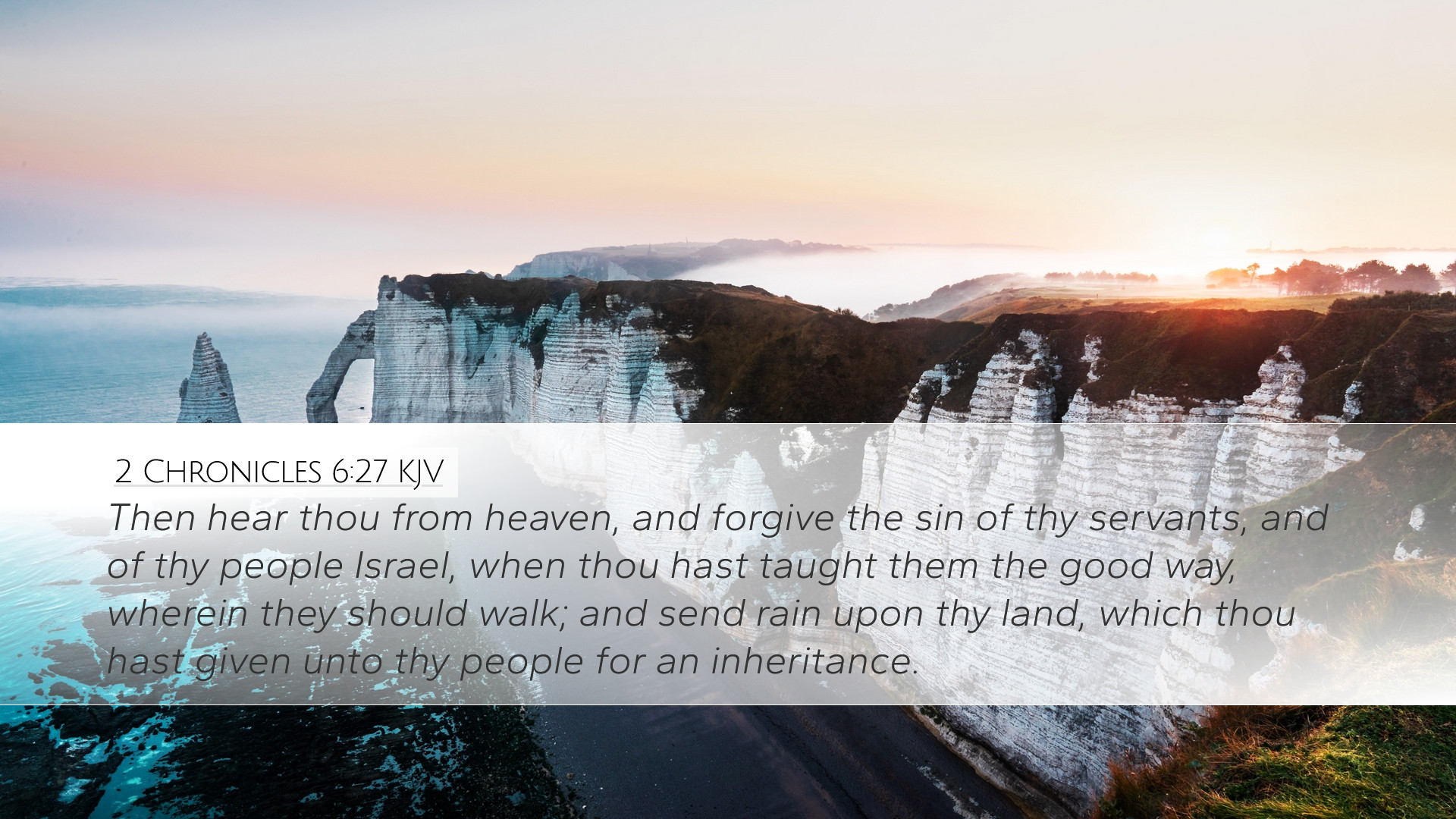Commentary on 2 Chronicles 6:27
Verse Context: 2 Chronicles 6:27 states, "Then hear thou from heaven, and forgive the sin of thy servants, and of thy people Israel, when thou hast taught them the good way wherein they should walk; and send rain upon thy land, which thou hast given to thy people for an inheritance." This verse is a part of Solomon's prayer during the dedication of the temple and highlights the importance of divine mercy and providence.
Overview
This passage encapsulates crucial themes found throughout the scriptures: forgiveness, guidance, and provision. In the context of Israel's relationship with God, Solomon pleads for God's attention and mercy. The theological implications here are significant, reflecting both the nature of God as a responsive and forgiving deity and the covenantal relationship between God and Israel.
Theological Insights
- Divine Attention: Solomon’s prayer illustrates the need for God to 'hear from heaven', emphasizing the belief that God is attentive to the prayers of His people. This concept is echoed by Matthew Henry, who notes that no prayer goes unheard if it is sincere and aligns with God’s will.
- Confession and Forgiveness: The plea for forgiveness is central to this verse. Adam Clarke points out that the acknowledgment of sin is a prerequisite for receiving grace. The recognition of human frailty and the necessity for divine forgiveness permeates the biblical narrative.
- Instruction in Righteousness: Solomon mentions God teaching Israel the "good way." This indicates that divine instruction is pivotal in leading people toward righteousness. Albert Barnes emphasizes the continuity of God’s guidance through His laws and precepts that shape His people's lives.
- The Provision of Rain: The request for rain upon the land symbolizes God’s providential support for His people. This is not merely a physical blessing, but a spiritual one that highlights dependence on God for sustenance and growth.
Historical Context
During the dedication of the temple, Solomon stands as a mediator between God and His people. This moment in Jewish history is significant as it marks the establishment of God’s dwelling among His people. The temple represents God’s covenant with Israel, and Solomon’s prayer expresses a deep recognition of both divine authority and human need.
Commentary Highlights
Matthew Henry
Ecclesiastical Importance: Henry highlights that Solomon's prayer serves as a model for the church today. Just as the Israelites sought God for forgiveness and guidance, so too must contemporary believers approach God with humility and reliance on His grace.
Albert Barnes
Covenantal Relationship: Barnes underscores that the plea for rain is not just for physical sustenance but represents a deeper need for spiritual renewal. He stresses that understanding one’s position before God is crucial for receiving His blessings.
Adam Clarke
Intercession: Clarke notes the role of Solomon as an intercessor and reflects on the importance of prayer as a means of seeking divine favor. He points out that the importance of collective prayer in the communal identity of Israel showcases the Biblical principle of unity in supplication.
Practical Applications
- Prayer and Dependence: Just as Solomon interceded for Israel, pastors and believers today are called to pray earnestly, recognizing their dependence on God's mercy and guidance.
- Community Forgiveness: This passage encourages communities of faith to seek corporate repentance and forgiveness. Christian communities can draw on this model to facilitate healing and restoration among members.
- Seeking God’s Guidance: Believers are reminded to actively seek God's 'good way' in their lives, whether through studying scripture, participating in collective worship, or engaging in church activities.
- Trusting in God’s Provision: The assurance of God's provision should inspire faith in believers that He will supply not only physical needs but also spiritual richness.
Conclusion
2 Chronicles 6:27 serves as a profound reminder of the relationship between humanity and God. It encapsulates a prayerful response to sin, a desire for guidance, and an acknowledgment of divine providence. Through the insights of respected commentators, this verse can illuminate the path of faith for today’s believers, reminding them of the timeless truths found within God's word. As pastors, students, theologians, and Bible scholars reflect on this passage, they are challenged to embody the heart of Solomon’s prayer in their own lives and ministries.


